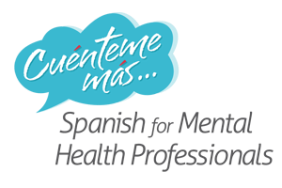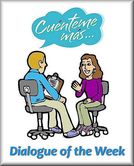by Cynthia M. Braden, MFT
Here we are presenting a list of verbs commonly used by the psychotherapist when establishing the Frame of Therapy and providing Consejos (advice & recommendations) to clients. We are highlighting the usted form of the verbs in the Present Imperative Tense, in some cases also known as the 'command' tense or subjunctive tense.
We demonstrate usage of these verbs in the usted form as that is the appropriate and professional way to address clients unless they are a child or young person. So here you will only have to memorize one form of the verb, isn't that great? It is good to memorize and practice this form so you can confidently structure the treatment and also make common therapeutic recommendations.
Unlike English, some Spanish verbs are mysteriously reflexive. So when you are saying "Siéntese por favor" you are actually saying 'sit yourself down'. To further complicate matters, some common verbs may also be stem-changing in the imperative tense and/or may require a reflexive construction.
This is something that needs to be memorized as it can't be figured out intuitively so we're showing you a few useful ones here.
We will also present the form "Le recomiendo que..." (I recommend that...). The verb that follows this clause will need to be in the imperative tense (same as subjunctive) in the third person since you don't know whether or not the action you are requesting will be performed.
Remember, it's always a good idea to keep the concepts of Respeto and Personalismo in mind by adding Por Favor and Gracias often! Usually you can add that at the beginning or end of statements.
We demonstrate usage of these verbs in the usted form as that is the appropriate and professional way to address clients unless they are a child or young person. So here you will only have to memorize one form of the verb, isn't that great? It is good to memorize and practice this form so you can confidently structure the treatment and also make common therapeutic recommendations.
Unlike English, some Spanish verbs are mysteriously reflexive. So when you are saying "Siéntese por favor" you are actually saying 'sit yourself down'. To further complicate matters, some common verbs may also be stem-changing in the imperative tense and/or may require a reflexive construction.
This is something that needs to be memorized as it can't be figured out intuitively so we're showing you a few useful ones here.
We will also present the form "Le recomiendo que..." (I recommend that...). The verb that follows this clause will need to be in the imperative tense (same as subjunctive) in the third person since you don't know whether or not the action you are requesting will be performed.
Remember, it's always a good idea to keep the concepts of Respeto and Personalismo in mind by adding Por Favor and Gracias often! Usually you can add that at the beginning or end of statements.
Verbs in the Imperative Tense Frequently Used in Psychotherapy
Decir - to tell
Contar - to tell (a story)
Sentar(se) - to sit down
Ir - to go
Venir - to come
Relajar(se) - to relax
Llamar - to call
Devolver - to return
| Firmar - to sign
Escuchar - to listen
Explicar - to explain
Hacer - to make or do
Llenar - to fill out
Repetir - to repeat
Respirar - to breathe
Hablar - to speak
Tomar - to take
|



 RSS Feed
RSS Feed



